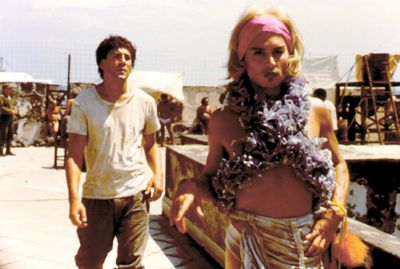  Javier Bardem and Johnny Depp in Before Night Falls. (© 2000 Fine Line Features. All rights reserved.) |
|
Before Night Falls, writer/director Julian Schnabelís passionate adaptation of Cuban writer Reinaldo Arenasí autobiography, is neither straightforward biopic nor free-associative tone poem. It is an uncertain amalgam of the two, presenting Arenasí life in feverish, disconnected chronology. Burrowing deep into Arenasí prose and poetry (we are read several of his works throughout), it tries valiantly to translate his personal torment into a visual style. It isnít always successful. The movie lurches forward and doubles back on itself with little regard for continuity. Through it all, it still manages to present the life of Reinaldo Arenas, a gay writer who was persecuted by the Castro regime and who fled to the United States where he eventually died of AIDS. The movie works better than it should because Schnabelís passion for his hero is evident in every frame. When that passion is presented through simple, spare images, Before Night Falls temporarily soars.
A former painter, Schnabel does create a gallery of stunning images that are likely to stay with you longer than the heroís life story. The movie opens with Arenasí childhood in an impoverished Cuban village. Sitting in a hole dug in the ground, the baby Arenas is like a divine foundling born from the earth. As a teenager, he is inclined to poetry much to the dismay of his father, who moves the family to the big city when he finds verse carved into the bark of his trees. Schnabel doesnít so much invoke these early scenes as recollect them, bathing them in the golden hue of memory. Thereís also a sense of doom as the young Reinaldo, unaware of his homosexuality, watches men bathe in a nearby river. With a single finger, he caresses the branch of a tree, an act that is innocent and erotic.
Before Night Falls is more generally handicapped by Bardemís heavily accented English, which at times begs for subtitles. In the post-screening conference, Schnabel admitted that the use of English was a concession to the filmís American audience. It seems like an unnecessary one. The movie works best when it lapses into Spanish, which is usually when one of Arenasí poems is being read to us. The rest of the international cast fares better, turning in colorful, sometimes brilliant performances. As Lazaro Gomez, Arenaís friend and eventual platonic lover, French actor Olivier Martinez gives the movie a much needed soul. He appears late in the story, but figures prominently when Arenas finally flees Cuba, persecuted for his writing and his sexuality, and moves to New York City. He and Lazaro move into a apartment. We forget for awhile the squalidness of the apartment as the two read to each other from one of Arenasí books. Michael Wincott plays a persecuted Cuban intellectual who is actually a composite of several real-life political prisoners. In one scene, he must endure a grueling kangaroo court, his face covered in sweat, as he painfully renounces his lifeís work. And in a brief role, Johnny Depp nearly steals the show as Bon-Bon, a transvestite inmate who helps smuggle Arenasí writing during one of his many stints in jail.
Depp shows up later in the movie as a different character, a slimy interrogator who canít keep his hands off his own crotch. Itís a risky bit of double casting that, like the movieís other surrealistic flares, causes more problems than its worth. Schnabel, who never settles on a single look for his movie, alternates film stock so that certain scenes have a grainy news footage quality. Why he does this is never clear, and it only distances us from Arenas. It isnít until the movieís harrowing final half-hour that Schnabel finds his beat. Poor, lonely, and dying, Arenas finds peace in "the anonymity of New York." The movie does too, photographing the cityís slums and tenements with sad regard as Bardem reads aloud one of Arenasí final poems. It is Before Night Fallsí best scene because it brings his words to life, giving them a heart, face and voice all at once.
[rating: 2½ of 4 stars] Distributor's Web site: Fine Line Features New York Film Festival Official Site
|



